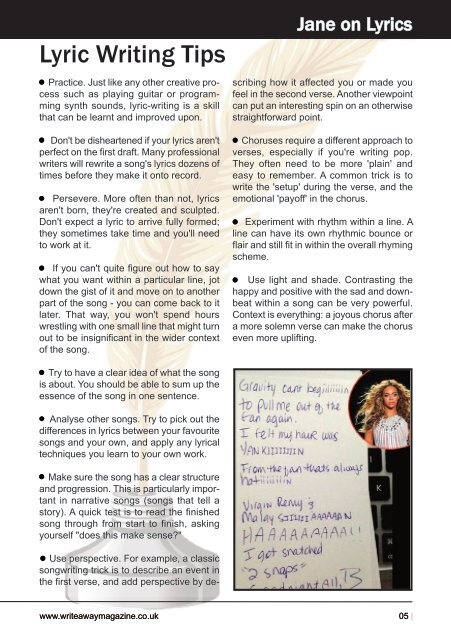Write Away Magazine - Issue No1
The brand new Lyric Writers magazine.
The brand new Lyric Writers magazine.
Create successful ePaper yourself
Turn your PDF publications into a flip-book with our unique Google optimized e-Paper software.
Lyric Writing Tips<br />
Practice. Just like any other creative process<br />
such as playing guitar or programming<br />
synth sounds, lyric-writing is a skill<br />
that can be learnt and improved upon.<br />
Don't be disheartened if your lyrics aren't<br />
perfect on the first draft. Many professional<br />
writers will rewrite a song's lyrics dozens of<br />
times before they make it onto record.<br />
Persevere. More often than not, lyrics<br />
aren't born, they're created and sculpted.<br />
Don't expect a lyric to arrive fully formed;<br />
they sometimes take time and you'll need<br />
to work at it.<br />
If you can't quite figure out how to say<br />
what you want within a particular line, jot<br />
down the gist of it and move on to another<br />
part of the song - you can come back to it<br />
later. That way, you won't spend hours<br />
wrestling with one small line that might turn<br />
out to be insignificant in the wider context<br />
of the song.<br />
Jane on Lyrics<br />
Use perspective. For example, a classic<br />
songwriting trick is to describe an event in<br />
the first verse, and add perspective by describing<br />
how it affected you or made you<br />
feel in the second verse. Another viewpoint<br />
can put an interesting spin on an otherwise<br />
straightforward point.<br />
Choruses require a different approach to<br />
verses, especially if you're writing pop.<br />
They often need to be more 'plain' and<br />
easy to remember. A common trick is to<br />
write the 'setup' during the verse, and the<br />
emotional 'payoff' in the chorus.<br />
Experiment with rhythm within a line. A<br />
line can have its own rhythmic bounce or<br />
flair and still fit in within the overall rhyming<br />
scheme.<br />
Use light and shade. Contrasting the<br />
happy and positive with the sad and downbeat<br />
within a song can be very powerful.<br />
Context is everything: a joyous chorus after<br />
a more solemn verse can make the chorus<br />
even more uplifting.<br />
Try to have a clear idea of what the song<br />
is about. You should be able to sum up the<br />
essence of the song in one sentence.<br />
Analyse other songs. Try to pick out the<br />
differences in lyrics between your favourite<br />
songs and your own, and apply any lyrical<br />
techniques you learn to your own work.<br />
Make sure the song has a clear structure<br />
and progression. This is particularly important<br />
in narrative songs (songs that tell a<br />
story). A quick test is to read the finished<br />
song through from start to finish, asking<br />
yourself "does this make sense?"<br />
www.writeawaymagazine.co.uk 05 |


